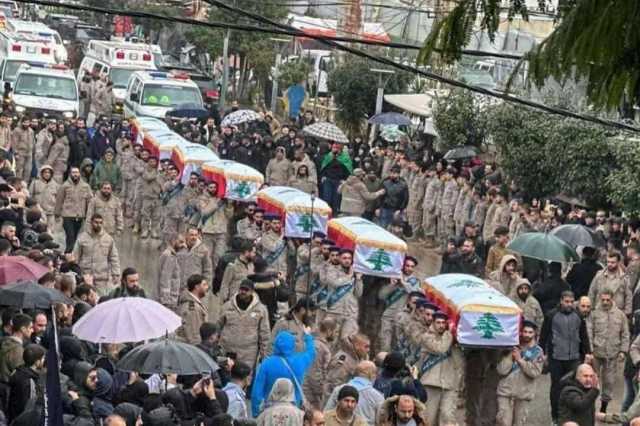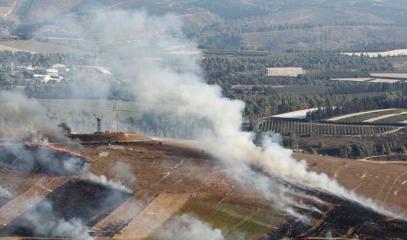War in Gaza (and Hezbollah-Israel tensions) new obstacles to presidential election
Regional tensions add to internal divisions, further distancing the prospects for an agreement on the election of the head of state. The pro-Iranian Shia movement attacks, but Tehran and Washington do not want a full-scale war. AsiaNews diplomatic source: implementation of UN Resolution 1701 and an internal agreement are essential.
Beirut (AsiaNews) - The obstacles that prevent the election of a new President of the Republic, a position that has been vacant since 31 October 2022, are added today to a further external element: the continuation of the fighting between Hamas and Israel in Gaza and "the war of support” to Hamas that Hezbollah launched against the Jewish State.
The vast majority of Lebanese are now taken hostage by this conflict. Faithful to the Iranian strategy of "unity of fronts", Hezbollah launched a low-intensity so-called "war of disturbance" against Israel, initially to relieve pressure on the Gaza enclave.
This diversion "did not lead to anything" explains the military expert Gen. Khalil Hélou. However, he continues, Hezbollah turns a deaf ear and says it is against any form of agreement at the border, in particular as regards the application of Security Council resolution 1701 - towards which, moreover, it does not say it is hostile - before to obtain a definitive agreement for a ceasefire in the Strip.
Two deputies representing the Christian faction, Gebran Bassil, head of the Free Patriotic Movement (Cpl) and Samy Gemayel, leader of the Kataëb party, have reiterated in recent days their hostility to the war involving Hezbollah in southern Lebanon. And which has caused several unnecessary victims in the area, destroyed the olive trees, rendered vast agricultural areas sterile due to the widespread use of phosphorus bombs and transformed entire border villages into ruins and ruins. In a homily during Sunday mass, celebrated two weeks ago, the head of the Maronite Church, Patriarch Beshara Raï, denounced "the culture of death" and the "illusory victories" that accompany this conflict.
So far the fighting has caused at least 262 deaths, including 38 civilians and 187 Hezbollah fighters, as well as displacing over 80 thousand people.
In reality, the fact that Iran and the United States have made the belligerents understand that they do not want a large-scale war has highlighted the now "forced" character of this conflict, and has allowed the Jewish State to exploit it for its own purposes. advantage of this new orientation. And this is also why, on February 20th, they were able to venture to bomb the industrial area of Ghaziyeh, 40 km from the borders, with the unfounded pretext of wanting to target some "Hezbollah weapons depots".
“The objective of this type of attack” analyzes Michael Young, an expert at the Carnegie pour le Proche-Orient center, “is to try to have an impact on the population, which Israel is trying to incite against Hezbollah”. The Iranian call to reduce the intensity of the conflict also explains the moderation shown by Hezbollah, which refrained from claiming responsibility for the raid on the Israeli military base in Safed, 15 km from the Lebanese border, which caused the death of one Israeli soldier and the wounding of many others. The operation was also used by the Jewish State as a pretext for a retaliatory bombing, which decimated a family of 11 people, including several children, in the city of Nabatiyeh, which hosts a large school of Antoniane nuns.
In any case, Western diplomatic sources interviewed by AsiaNews believe that the only valid and practicable solution on the border with Israel is "the application of 1701", which involves the deployment of the Lebanese army and Unifil forces south of the Litani river. “The key - continues the source - to the Lebanese tragedy exists, it is called Security Council Resolution 1701, but no one wants to use it”.
Internal vetoes
On the front of the conflicting internal vetoes that have effectively frozen the presidential election, with the further block represented by the war in Gaza which seems to be closely linked to the vote, efforts continue in an attempt to reach a compromise. The ambassadors of the "Group of Five" (United States, France, Saudi Arabia, Egypt and Qatar) held a coordination meeting at the Résidence des Pins on the afternoon of February 20th. “They took stock of the latest developments and discussed the next steps to be taken” reads a press release from the embassy.
In this regard, political analysts find it difficult to imagine that Hezbollah does not want to reap the fruits of its military commitment, even if the pro-Tehran Shiite movement pays lip service to the opposite. For their part, Christian parties believe that Hezbollah itself should not be rewarded for its "adventurism". However, "the conflicting geopolitical polarizations of the Lebanese parties, which continue to slow down the process, should not prevent the main interested parties from consulting" underlines the AsiaNews source, who requests anonymity for security reasons. "And it is in the interest of all Lebanese and of the country's economy - he concludes - that the institutions resume their place in national life".
17/05/2021 10:29








.png)










